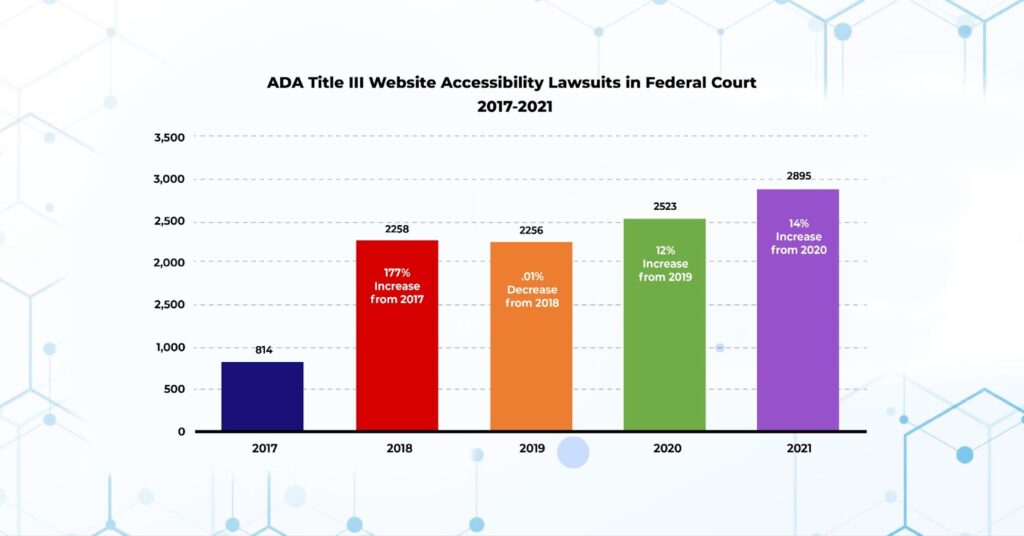The Federal Law necessitates that all public accommodations should be accessible to everyone irrespective of their disabilities. ADA (Americans with Disabilities Act) being a federal civil rights law is being enforced by the U.S Department of Justice and under Title III entails websites as places of public accommodation rendering information to the public.
With billions of people using the internet every day for remote work to social engagement, it is quintessential that the websites are designed keeping accessibility in mind. While a lot of designers and business owners overlook the social responsibility of being inclusive, it can often lead to a decrease in the potential users, degeneration of the brand name, and increases their risk of litigation.
In other words, if your online business does not promote inclusivity and equity, you are likely to experience legal turf and as per statistics the number of ADA lawsuits has more than quadrupled since 2013.
Demand Letter- Introduction
Does the name throw you into a panic? Let us get friendlier with the anatomy of the ADA Demand Letter.
If you are a business owner, it’s important to be aware of the Americans with Disabilities Act (ADA). The ADA is a civil rights law that prohibits discrimination against individuals with disabilities in all areas of public life, including jobs, schools, transportation, and all places that are open to the general public.
An ADA demand letter is a formal notice from a disabled individual, advocacy group, mass-filing attorney, or organization stating that they believe your online business(website/app) is not in compliance with the accessibility guidelines. The letter will usually outline specific areas of concern and may solicit you to take rectifying measures. It may also request information about your policies and procedures for accommodating individuals with disabilities.
It’s important to note that receiving an ADA demand letter does not mean that your business is actually out of compliance with the law. In many cases, these letters are simply a way for the sender to try and extract a settlement from you. It means that someone believes there is room for improvement in terms of accessibility.
However, it’s always best to err on the side of caution and consult with an attorney before taking any action.
Know the Law
The Americans with Disabilities Act came into effect in the year 1990. Title III of the ADA prohibits discrimination in places of public accommodation and that encompasses private businesses. ADA mandates that all the content and services provided online are accessible for all users and don’t create barriers for disabled individuals using assistive technologies.
While the ADA does not cover all disabilities, it does provide scope where people with disabilities must be given equal access to any place of public accommodation. A detailed report by Seyfarth exhibits the rise in accessibility lawsuits by plaintiffs over the last few years.

Any digital platform is also considered public accommodation as it is made available to individuals worldwide. ADA states that all digital content should be designed to integrate users using assistive technology, and otherwise.
The ADA along with the WCAG guides us to design an accessible digital product by incorporating accessibility right from the designing phase and keeping it in mind while updating the content.
Course of Action
Facing a demand letter is a pressing scenario for small and big businesses alike as it is detrimental to both revenue and reputation. These letters are becoming increasingly common, but that doesn’t mean you’re not obligated to make changes to your property.
If you receive an ADA demand letter, it is important to take the claim seriously and respond appropriately. The first step involves hiring an accessibility partner to review the specific allegations made in the demand letter and determine if there are any areas of your business that may need to be improved to comply with the ADA. Once your accessibility partner has identified any potential areas of non-compliance, you should together develop a plan to address these issues and make your business more accessible to all.
Concurrently, you should contact an experienced attorney who can help you navigate the situation and determine the best course of action. Depending on the specific circumstances of your case, you may be able to resolve it without going to court. However, if necessary, your attorney can help you defend your business in court and protect your rights.
Possible Outcomes
If you are in luck and can come to an agreement with the individual or organization who sent the demand letter, be sure to put any agreed-upon changes in writing and make them promptly.
If in case you are not able to reach an agreement, you may need to seek legal counsel to help you navigate the next steps. Regardless of how you choose to proceed, it is essential to take action as soon as possible to avoid further penalties or litigation.
Friend in Need
We all know the expression- “It’s better safe than sorry” and we firmly recommend it.
We are not legal consultants but with our fair share of exposure, we can steer you in the right direction. Since we would never want you to be in such a predicament, our team of accessibility service vendors at Pivotal Accessibility advocates for you to make your websites accessible right from the idea’s inception and lower the risk of potential lawsuits. Because alongside the legal expertise, one needs technical assistance to examine the minutiae to unearth all possible inaccessibility scenarios manually —
We propose a periodic accessibility audit be performed on your website or app to ensure WCAG 2.1 AA compliance.
To get started with your online venture or for retrofitting changes, talk to our digital accessibility expert today.

